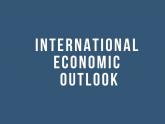Monday, 22 July 2024
This is the first in a series of semiannual reports on the main dynamics of the current global economy and the short term outlook. It is divided into five sections that encompass level of activity, world trade in goods and services, commodities, investment and finance. In addition, the product and trade sections provide in-depth information on the indicators of seven economies of relevance for the world and for Argentina; namely, Brazil, China, the United States, the European Union, India, Chile and Vietnam.
- After successive shocks (the pandemic, the war in Ukraine, the conflict in the Middle East), the global economy is registering a normalisation of its growth, although at lower levels than in the decade prior to 2020.
- During 2023, trade fragmentation increased due to the influence of geopolitical issues, and a decrease in the rate of growth of global trade was reported.
- Although no recession is expected globally during 2024, economic growth will be moderate: 3.2% according to the IMF, below the average growth of 3.6% in the 2010s. This slowdown is largely explained by the effect of geopolitical factors, contractionary policies to combat inflation, the slowdown in global trade growth and the fall in foreign direct investment flows.
- Lower growth in the United States and China, and a lack of momentum in the European Union economy will condition average global growth during 2024. Conversely, the emerging economies will be the leading ones.
- Commodity prices, including agricultural commodities, are showing a downward trend, although still above pre-pandemic levels. There are some exceptions, such as gold, whose price increased as a result of the rise in global uncertainty.
- The trend to the rise of the burden of trade in services in global GDP continues. The most prominent are those services provided digitally, and among them, professional services.
- The scenario of high interest rates and inflation still above the objectives of central banks, in a context of high indebtedness –the effect of the post-pandemic fiscal expansion– increases the likelihood of financial stress, particularly for emerging economies with low debt ratings.
- Uncertainty is still a factor that continues to count when no prevision can be made. The current context of war conflicts, geopolitical crises and extreme weather events could have major effects on the global economy.
Related documents:


